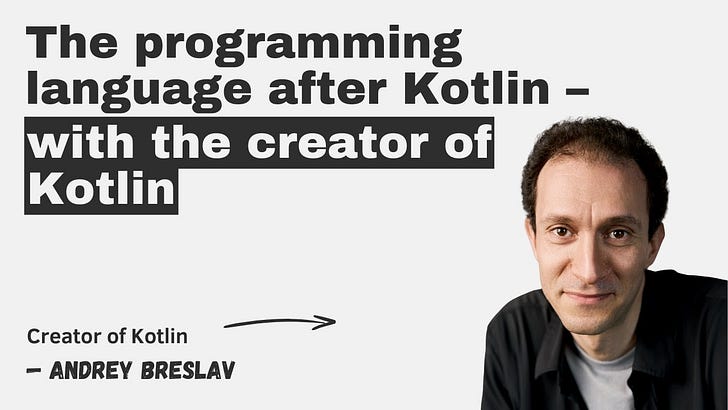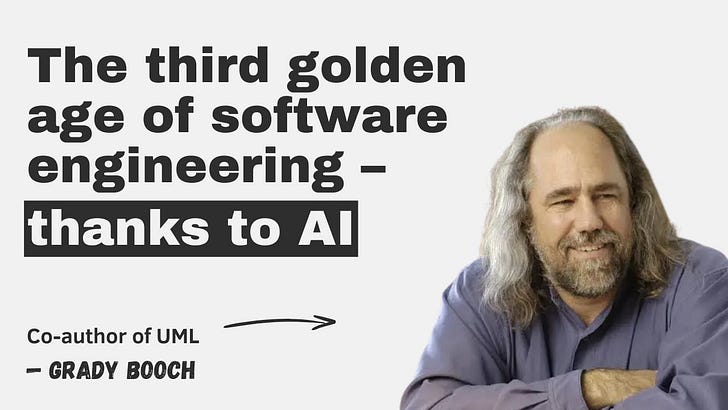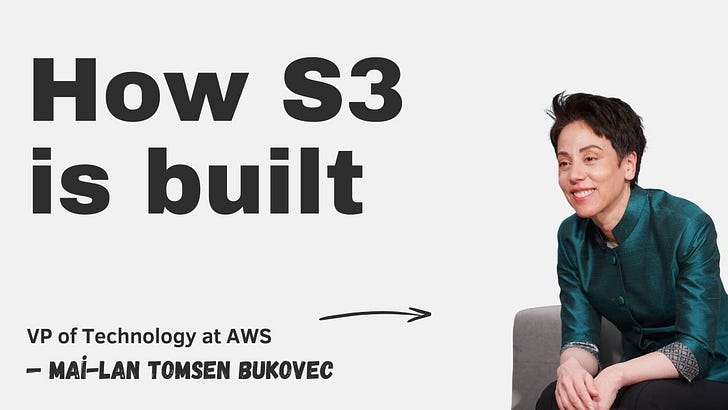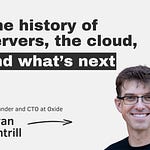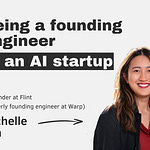The Pragmatic Engineer Podcast had a very warm reception with the first episode — thank you! Two weeks later, here is episode #2, with a CEO who still codes every day: Quinn Slack at Sourcegraph.
Listen now on Apple, Spotify, and YouTube.
Brought to you by:
• Paragon: Build native, customer-facing SaaS integrations 7x faster.
• Enterprise Ready Conferfence on 30 October: a one-day event in SF for product and engineering leaders shaping the future of enterprise SaaS.
On today’s episode of The Pragmatic Engineer, I’m joined by Quinn Slack, CEO and co-founder of Sourcegraph, a leading code search and intelligence platform. Quinn holds a degree in Computer Science from Stanford and is deeply passionate about coding: to the point that he still codes every day! He also serves on the board of Hack Club, a national nonprofit dedicated to bringing coding clubs to high schools nationwide. In this insightful conversation, we discuss:
How Sourcegraph's operations have evolved since 2021
Why more software engineers should focus on delivering business value
Why Quinn continues to code every day, even as a CEO
Practical AI and LLM use cases and a phased approach to their adoption
The story behind Job Fairs at Sourcegraph and why it’s no longer in use
Quinn’s leadership style and his focus on customers and product excellence
The shift from location-independent pay to zone-based pay at Sourcegraph
And much more!
Takeaways
Some of my main takeaways from this conversation are these.
1. As software engineers, it’s increasingly important to understand what value you add to the business. A big difference between 2021 and 2024 is how companies are much more focused on efficiency: meaning they are hiring more conservatively, and less likely to fund teams with headcount that don’t contribute to the core focus of the company.
As a developer or manager, try to figure out how much your team contributes in revenue, or savings, or other key goals to the company. Are you working in what the company would consider as a profit center, or what is more as a cost center? We did a deepdive on this topic in The Pragmatic Engineer: check out the article, linked in the show notes.
2. AI tools are great to eliminate the toil that we, developers face, day-to-day. There are AI tools that position themselves as their goal being “replacing developers.” I found it sympathetic that Quinn did not think this is the sensible path. His approach is to start by using AI tools with some of the “dumbest things” like generating the changelog for a software release – I mean, assuming you generate a changelog. And then you take tedious tasks where these tools could help, and see if you can automate some more.
Do this one step at a time: and it will actually help devs and teams, and it’s a lot more achievable than saying “let’s replace this whole complicated workflow with AI.”
3. The reality of location independent pay is that it stops being sensible above a certain company size. Sourcegraph was one of the few companies that offered the same base salary regardless of where people worked at. They did this until they grew to about 200 people, and switched this model to a location-indexed model.
Quinn was honest about why they did it: because keeping this would have not made sense for the company, from the business point of view. Basically, location-independent pay means the company can hire very easily in low-cost regions, but it’s hard or impossible to do this in high-cost regions. It also creates the incentive for employees to move to a low cost region where they can save more. In the end, I don’t know of any company with more than 200 people that pays location-independent: all large companies have some kind of indexing on location, and the best companies just pay the top of the local market. We cover more about compensation in the deepdive on The trimodal nature of software engineering salaries.
If you enjoy the podcast, I’d very much appreciate if you subscribe on your favorite podcast player, and leave a review. It helps the podcast be discovered by more people. Thank you!
Show notes
Where to find Quinn Slack:
• X: https://x.com/sqs
• LinkedIn: https://www.linkedin.com/in/quinnslack/
• Website: https://slack.org/
In this episode, we cover:
(01:35) How Sourcegraph started and how it has evolved over the past 11 years
(04:14) How scale-ups have changed
(08:27) Learnings from 2021 and how Sourcegraph’s operations have streamlined
(15:22) Why Quinn is for gradual increases in automation and other thoughts on AI
(18:10) The importance of changelogs
(19:14) Keeping AI accountable and possible future use cases
(22:29) Current limitations of AI
(25:08) Why early adopters of AI coding tools have an advantage
(27:38) Why AI is not yet capable of understanding existing codebases
(31:53) Changes at Sourcegraph since the deep dive on The Pragmatic Engineer blog
(40:14) The importance of transparency and understanding the different forms of compensation
(40:22) Why Sourcegraph shifted to zone-based pay
(47:15) The journey from engineer to CEO
(53:28) A comparison of a typical week 11 years ago vs. now
(59:20) Rapid fire round
The Pragmatic Engineer deepdives relevant for this episode:
• Inside Sourcegraph’s engineering culture: Part 1 https://newsletter.pragmaticengineer.com/p/inside-sourcegraphs-engineering-culture
• Inside Sourcegraph’s engineering culture: Part 2 https://newsletter.pragmaticengineer.com/p/inside-sourcegraphs-engineering-culture-part-2
Referenced:
• Sourcegraph: https://sourcegraph.com/
• SharePoint: https://www.microsoft.com/en-us/microsoft-365/sharepoint/collaboration
• Google Code Search: https://developers.google.com/code-search
• Steve Yegge on LinkedIn: https://www.linkedin.com/in/steveyegge
• Shopify: https://www.shopify.com/
• Tobi Lutke still writes code for Shopify: https://news.ycombinator.com/item?id=25003574
• Gitlab: https://about.gitlab.com/
• Scott Kirby on LinkedIn: https://www.linkedin.com/in/jscott-kirby/
• Beyang Liu on LinkedIn: https://www.linkedin.com/in/beyang-liu/
• Perl: https://www.perl.org/
• Booking.com: https://www.booking.com/
• Loom: https://www.loom.com/
• CleanShot: https://cleanshot.com/
• Kazam: https://launchpad.net/kazam
• Ollama: https://ollama.com/
• StarCoder: https://huggingface.co/blog/starcoder
• Llama: https://www.llama.com/
• The Years of Lyndon Johnson: The Path to Power; Means of Ascent; Master of the Senate; The Passage of Power: https://www.amazon.com/Robert-Caros-Years-Lyndon-Johnson/dp/038535147X
• The Life Of Mahatma Gandhi: https://www.amazon.com/Life-Mahatma-Gandhi-Louis-Fischer/dp/1784700401
• Nimitz at War: Command Leadership from Pearl Harbor to Tokyo Bay: https://www.amazon.com/Nimitz-War-Command-Leadership-Harbor/dp/0190062363/r
Production and marketing by https://penname.co/. For inquiries about sponsoring the podcast, email podcast@pragmaticengineer.com.







